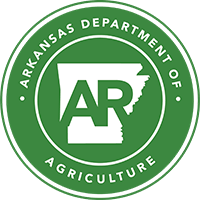Plant Industries
Serving the citizens of Arkansas and the agricultural and business communities by providing information and unbiased enforcement of laws and regulations set by the Arkansas State Plant Board
Agriculture / Plant Industries / Quality Control and Compliance (Feed, Fertilizer, Hemp, Seed) / Seed Section / Certification / Certification Steps
Certification Steps
Steps for Certifying Seed in Arkansas
- Call, e-mail, or refer to the bottom of this linked page for the regulations (Circular 15) and an application for the crop you want to certify. Study the regulations carefully. A list of seed applied on for certification is maintained in the Arkansas Certified Seed Directory.
- Secure an approved source of seed, as listed in the Circular 15 regulations.
- Send the completed application to the Arkansas Department of Agriculture - Seed Certification Office, 1 Natural Resources Drive, Little Rock, Arkansas 72205, or e-mail to Meredith Martinez, or call (501) 225-1598. Unless you use your own certified seed, be sure to include with your application a copy of the invoice showing purchase of the seed, and a set of tags from one of the bags. Check the regulations for each crop as to what time of year applications should be submitted.
- Completely clean all planting equipment of other seeds, and plant the seed for certification in a field which is relatively free of noxious weeds (one which conforms to the crop listed in Circular 15 regulations) as to isolation from other crops as well as crops grown on this field in previous years.
- Prior to the field inspection by the Arkansas Department of Agriculture (Department) field inspectors, be sure to rogue your field of all Arkansas noxious weeds, other crops, and off-type plants. This is a very important point, as it may mean the difference of the field being certified or disqualified.
- Be sure to notify your Department area inspector, or the Seed Certification office, about two weeks ahead of the expected harvest date so the necessary field inspection can be scheduled. Always make sure the field has been inspected by the Arkansas Department of Agriculture field inspectors before harvesting.
- Completely clean all harvesting equipment and storage of all other seeds so that no mixture will occur at this point. The method of harvesting and the storage should be approved by the Seed Certification Office or Department field inspectors (check the cotton regulations for special requirements as to ginning and storage of seed).
- After harvest is completed, report to the Seed Certification Office the number of bushels of seed saved for certification.
- Keep a close check on the seed in storage to see that the moisture content is low enough to prevent heating. Before cleaning, send in a representative sample for a preliminary test. This would not be an official test, but would give information as to the quality of the seed for conditioning decisions.
- Use the best equipment available for cleaning and treating seed. If you are using someone else's facilities to clean your seed, you may request the Department field inspectors to inspect the cleaning equipment just prior to the cleaning of your seed.
- New containers, approved reusable containers, or dedicated bulk bins must be used for seed that is for certification.
- After the seed has been cleaned, notify the Department area inspector to pull an official representative sample for an analysis and moisture test. If this analysis conforms to the regulations, you are eligible for tags or bulk certificates on your seed. Cottonseed may be officially sampled before being cleaned either in bulk or bags. Note: only Certified Blue-Tag class seed may be sampled in the bulk and be eligible for tags or certificates. Registered and Foundation class seed must be cleaned and bagged prior to being sampled by the area inspector.
- Tags and/or bulk certificates are issued when ordered by the applicant.
- By carefully following the outline above you should not experience too much difficulty in getting your seed certified. If at any time you have questions or are in doubt about the next step to take, please feel free to contact the Seed Certification office at (501) 225-1598.

